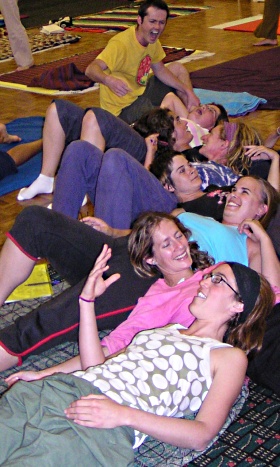 As Head of Voice at Melbourne University and accomplished vocalist, Stephen Grant has many roles to play in professional life. But one thing common to everything he does is the Feldenkrais Method.
As Head of Voice at Melbourne University and accomplished vocalist, Stephen Grant has many roles to play in professional life. But one thing common to everything he does is the Feldenkrais Method.
The Practical Anatomy course that he co-teaches to voice students at Melbourne University includes 12 weeks of Awareness Through Movement (ATM) lessons. However, he says his application of the Method extends far beyond that. “It really does underlie my whole way of teaching, which is very much about allowing people to trust their own experience, understand their own experience. It’s giving people the space to figure things out for themselves,” Stephen says.
Stephen has been introducing ATM into higher education and the lives of vocal students since his posting as Lecturer in Voice at the Victorian College of the Arts in 2004. He spent four years there savouring the opportunity to integrate the Method into a 3-year Bachelor of Music Performance course.
The spark for this passion began when he was studying voice in Germany, during which time a friend, who had introduced him to the Feldenkrais Method some years before, let him know about an upcoming Feldenkrais training. “I was at the time really questioning of the way singing was taught and the whole pedagogy of music. There’s often a focus on getting a result but without much of a sense often of how you get there,” he says.
Stephen did a professional Feldenkrais training in Miami and has been continuing to experience the effects on voice since, with professional and personal implications. “The voice is an area of ourselves that can have a huge impact on our lives,” he says.
“When you have the ability to connect with the voice on that organic level, as you do with the Feldenkrais Method, you can enter into this learning process – things emerge out of that, and they seem to emerge in a very natural way that doesn’t necessarily have to be confronting.”
For Stephen that has meant a natural blossoming as a more extraverted performer who can find a greater range of emotion on stage. He credits the clear distinction between the learning context and the performance context.
“In that learning context (of ATM) we extend our awareness out tentacle-like, and we can then take that into an integrated practice, whether it’s walking down the street or singing in a concert. And when we’re doing that integrated practice, we don’t have to attend to all the various details that went into it; we can just have a sense of how that learning process informed what we do.
“That’s really important because when you start attending to the many things that one can attend to in a lesson, it’s part of the learning process, and we can move beyond that detailed attending when we go into the performance context.
“You don’t want people going into performance thinking about a million different things; you want them to just be able to focus on their performance. And I’m pretty confident that’s what Feldenkrais’ intention was. Not to be lost in the world of trying to direct your posture all the time, focused on all those details, when you really need to be thinking about what you’re doing.”
Stephen’s ideal future will be one where all music teachers will have a grounding in the Method to allow for freer performance and less musical casualties to repetitive strain injury.

